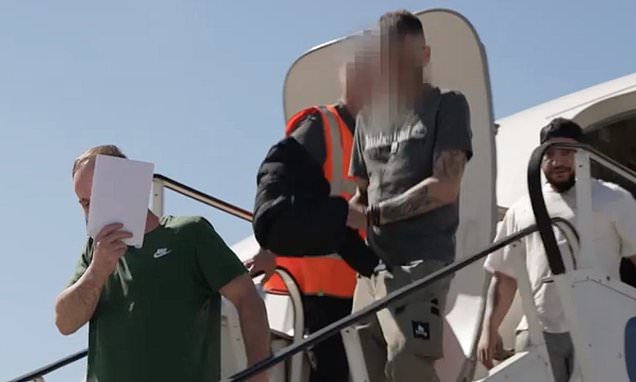For the first time, cameras have been allowed on board a deportation flight carrying convicted foreign criminals out of the UK.
The footage, captured by ITV News, reveals a process that is usually kept behind closed doors—one that is costly, tightly controlled, and controversial.
What Happens Before Takeoff
The journey begins in a deportation centre near Heathrow, where journalists were able to speak with some of the offenders before boarding.
When one was asked if he wanted to go home, his answer was blunt: “No. I’ve been living here ten years.”
Another refused to say what crime he had committed.
The Security Measures in Place
Security is extremely tight.
Each passenger is escorted by as many as six staff members just to walk them up the stairs to the aircraft.
Some offenders are restrained to prevent outbursts or escape attempts.
The scale of the operation is staggering—nearly 100 staff were involved to deport 47 individuals, most of them men but with a handful of women onboard.
The Role of Money in Deportations
Perhaps the most surprising revelation is the cash incentive.
Some deportees were given bank cards pre-loaded with £2,000 under the Facilitated Return Scheme.
The money is meant to encourage offenders to agree to leave voluntarily and to help them restart their lives once they land back in Romania.
As soon as they touched down, they were free to withdraw the funds and go their way.
Who These Offenders Are
Those on board had originally entered the UK legally but lost their right to stay after committing serious crimes, including violent and sexual offences.
Their deportation is part of a wider government push to reduce the number of foreign nationals in Britain’s overcrowded prisons. At present, more than 10,000 inmates are foreigners.
Flights That Leave in the Dead of Night
Deportation flights take off at night to avoid the risk of protests.
Each person is transported in secure vehicles, sometimes individually if they’re deemed high risk.
The Home Office does not disclose which airline or airport is used, for obvious security reasons.
Some offenders, however, manage to delay or avoid flights entirely by launching last-minute legal challenges.
A Divisive Incentive Scheme
Home Secretary Shabana Mahmood admitted that the optics of handing £2,000 to criminals are troubling.
“It doesn’t look good,” she acknowledged. But she argued that voluntary removals save taxpayers money compared to lengthy legal battles.
Her position is that stronger borders will reassure the public while keeping space open for genuine migrants who want to contribute positively to the UK.
Political Reactions and Concerns
Mahmood has also raised concerns about the rise of far-right sentiment, saying secure borders are necessary to protect race relations in the UK.
At the same time, she has pledged to intensify “one-in, one-out” deportations with France, where Channel-crossers are returned in exchange for approved applicants relocating to Britain.
So far, only three removals have been carried out under the scheme, but she insists the numbers will grow.
The Bigger Challenge Ahead
Despite these efforts, a new analysis suggests Britain is facing an uphill battle.
Deportations for certain nationalities are happening at such a slow pace that it could take decades to clear the backlog.
For example, only two of the 145 Eritrean criminals in UK prisons were deported in the past year.
At that rate, it would take 73 years to remove all of them.
Similarly, the deportation of Iranian, Somali, and Jamaican offenders is progressing at a glacial speed.
What Comes Next
The government insists it will ramp up removals, but the scale of the challenge is clear.
With more than 5,000 foreign national offenders deported last year and many more waiting in overcrowded prisons, the debate over cost, fairness, and security is unlikely to fade anytime soon.
